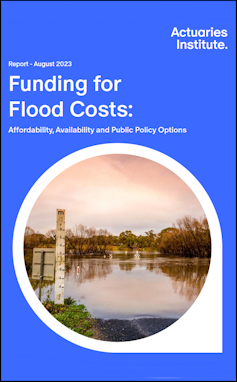Home insurance bills are soaring as climate risks grow. The government should step in
- Written by Paula Jarzabkowski, Professor in Strategic Management, The University of Queensland

The Actuaries Institute of Austalia[1] has just confirmed what many Australian households already know – home insurance is increasingly unaffordable.
It found average premiums climbed 28% in the year to March, while premiums for higher-risk properties, such as those in flood-prone areas, climbed 50%.
The institute also found 12% of Australian households – 1.24 million – are experiencing extreme home insurance affordability stress, defined as paying more than four weeks of gross household income on premiums.
Twelve months ago, this figure was 10%, or 1 million households.







